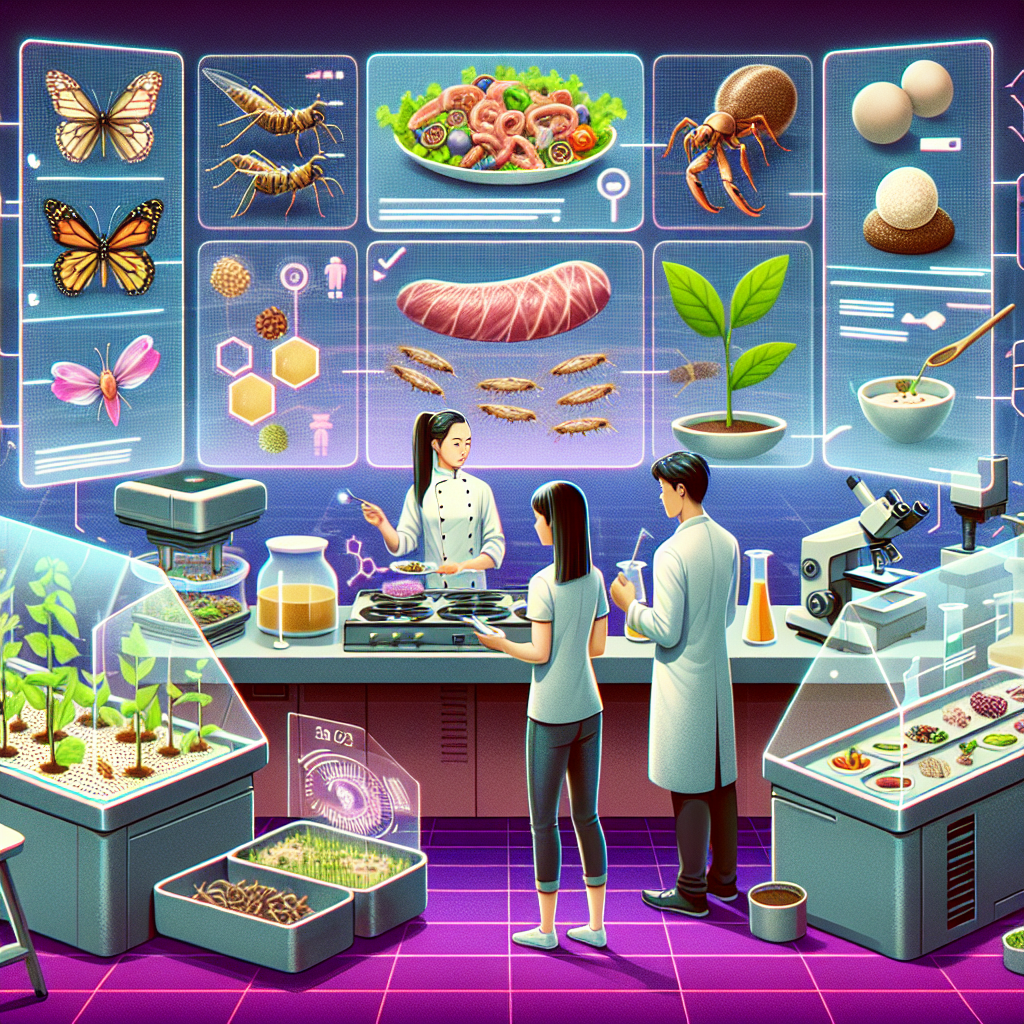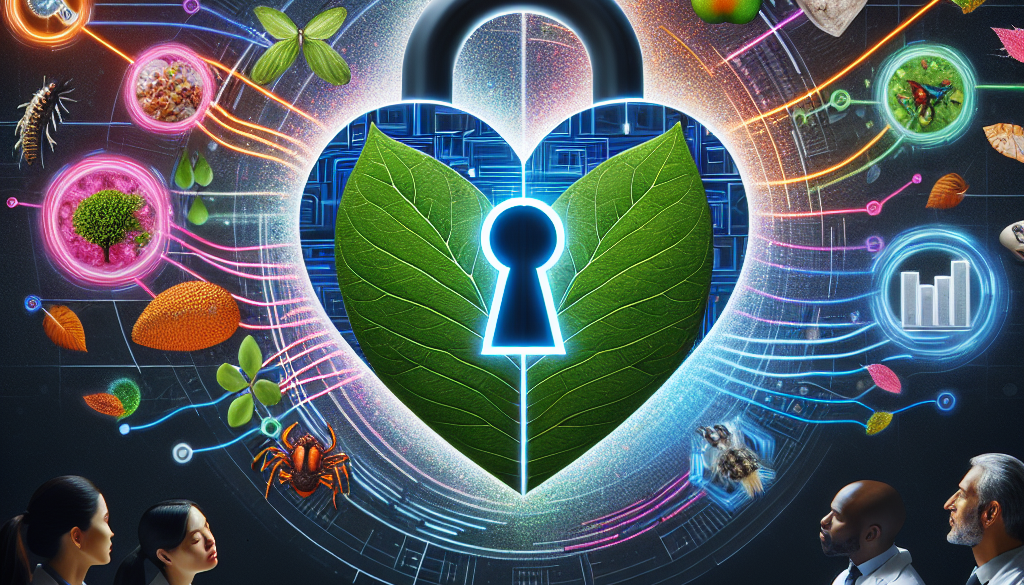Unlocking the Future of Nutrition with Alternative Proteins
-
Table of Contents
- Alternative Proteins: Paving the Way for Nutritional Innovation
- The Rise of Alternative Proteins
- Benefits of Embracing Alternative Proteins
- Exploring the Spectrum of Alternative Proteins
- Plant-Based Proteins
- Insect Proteins
- Algae and Microbial Proteins
- Cultured Meat
- Challenges and Considerations
- Integrating Alternative Proteins into Diets
- Conclusion: The Future of Nutrition is Here
- Discover ETprotein’s High-Quality Alternative Proteins
Alternative Proteins: Paving the Way for Nutritional Innovation

The quest for sustainable and health-conscious dietary options has led to a significant shift in the way we think about protein. Traditional sources of protein, such as meat, dairy, and eggs, are being reevaluated in the face of environmental concerns, ethical considerations, and health trends. This has given rise to the burgeoning field of alternative proteins, which promises to revolutionize the future of nutrition. In this article, we delve into the world of alternative proteins, exploring their benefits, challenges, and potential to transform our diets.
The Rise of Alternative Proteins
Alternative proteins are derived from non-traditional sources, including plants, insects, algae, and lab-grown meat. These sources are gaining popularity as they offer a sustainable and often healthier option compared to conventional animal proteins. The market for alternative proteins is expanding rapidly, with a projected value of $17.9 billion by 2025, according to a report by MarketsandMarkets.
Benefits of Embracing Alternative Proteins
- Sustainability: Alternative proteins generally have a lower environmental footprint, requiring less water, land, and energy to produce than animal-based proteins.
- Health Benefits: Many alternative protein sources are rich in nutrients and lower in saturated fats and cholesterol, contributing to better heart health and reduced risk of chronic diseases.
- Ethical Considerations: For those concerned with animal welfare, alternative proteins offer a way to reduce reliance on animal agriculture and its associated ethical issues.
- Food Security: Alternative proteins can contribute to global food security by providing additional and more accessible protein sources for a growing population.
Exploring the Spectrum of Alternative Proteins
Alternative proteins come from a variety of sources, each with its unique advantages and challenges. Here’s a closer look at some of the most promising types:
Plant-Based Proteins
Plant-based proteins, such as those from soy, peas, and rice, are the most established alternatives to animal proteins. They are versatile, can be produced sustainably, and are increasingly being used in products like meat substitutes, protein bars, and shakes.
Insect Proteins
Insects are a highly efficient protein source, with a high feed-to-protein conversion rate. They are also rich in essential amino acids and micronutrients. However, consumer acceptance remains a significant hurdle in many Western countries.
Algae and Microbial Proteins
Algae, such as spirulina, and microbial proteins, like those from fungi or bacteria, offer a sustainable protein source with minimal land use. They are also gaining traction in the alternative protein market.
Cultured Meat
Lab-grown or cultured meat is produced by cultivating animal cells in a controlled environment. This technology is still in its infancy but holds the promise of meat production with drastically reduced environmental impact.
Challenges and Considerations
Despite the potential of alternative proteins, there are challenges to overcome:
- Scaling Production: Scaling up production to meet global demand while maintaining quality and affordability is a significant challenge.
- Regulatory Hurdles: Ensuring that new protein sources meet food safety standards and receive regulatory approval can be a lengthy process.
- Consumer Acceptance: Educating consumers and overcoming preconceived notions about non-traditional protein sources is essential for widespread adoption.
- Nutritional Profile: Ensuring that alternative proteins provide a complete amino acid profile and other essential nutrients is crucial for them to be a viable replacement for animal proteins.
Integrating Alternative Proteins into Diets
For alternative proteins to make a significant impact, they must be integrated into everyday diets. This requires innovation in food technology to create appealing and nutritious products, as well as efforts to educate consumers about the benefits of alternative proteins.
Conclusion: The Future of Nutrition is Here
Alternative proteins offer a promising solution to many of the challenges facing our current food system. They have the potential to provide sustainable, ethical, and nutritious options that can cater to a diverse range of dietary needs and preferences. As technology advances and consumer awareness grows, alternative proteins are set to play a pivotal role in shaping the future of nutrition.
Discover ETprotein’s High-Quality Alternative Proteins
If you’re looking to incorporate alternative proteins into your diet or product offerings, ETprotein is your go-to source. With a wide range of organic bulk vegan proteins and L-(+)-Ergothioneine, ETprotein ensures top-quality, non-GMO, allergen-free options that cater to various industries. Their commitment to neutrality in taste and high purity levels makes their products ideal for anyone seeking to embrace the future of nutrition.
About ETprotein:
ETprotein, a reputable protein and L-(+)-Ergothioneine (EGT) Chinese factory manufacturer and supplier, is renowned for producing, stocking, exporting, and delivering the highest quality organic bulk vegan proteins and L-(+)-Ergothioneine. They include Organic rice protein, clear rice protein, pea protein, clear pea protein, watermelon seed protein, pumpkin seed protein, sunflower seed protein, mung bean protein, peanut protein, and L-(+)-Ergothioneine EGT Pharmaceutical grade, L-(+)-Ergothioneine EGT food grade, L-(+)-Ergothioneine EGT cosmetic grade, L-(+)-Ergothioneine EGT reference grade and L-(+)-Ergothioneine EGT standard. Their offerings, characterized by a neutral taste, non-GMO, allergen-free attributes, with L-(+)-Ergothioneine purity over 98%, 99%, cater to a diverse range of industries. They serve nutraceutical, pharmaceutical, cosmeceutical, veterinary, as well as food and beverage finished product distributors, traders, and manufacturers across Europe, USA, Canada, Australia, Thailand, Japan, Korea, Brazil, and Chile, among others.
ETprotein specialization includes exporting and delivering tailor-made protein powder and finished nutritional supplements. Their extensive product range covers sectors like Food and Beverage, Sports Nutrition, Weight Management, Dietary Supplements, Health and Wellness Products, and Infant Formula, ensuring comprehensive solutions to meet all your protein needs.
As a trusted company by leading global food and beverage brands and Fortune 500 companies, ETprotein reinforces China’s reputation in the global arena. For more information or to sample their products, please contact them and email sales(at)ETprotein.com today.












